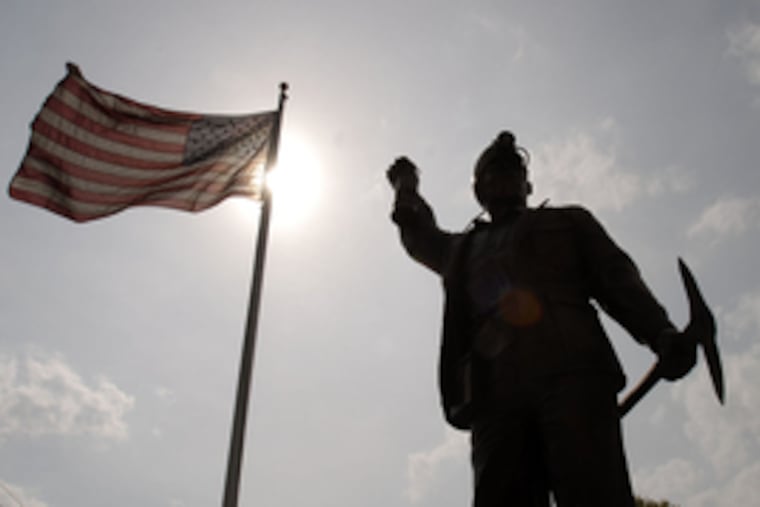Masculinity is the unspoken undercurrent in Trumpism and the fracking debate | Opinion
A clean energy future is as much about liberation from gendered ideas of work as environmental policy.

I am a son of Pennsylvania’s fracking region. My father and stepfather and generations of men in my family have worked in fossil fuels: first in coal, before the mining companies consolidated then collapsed, and now in fracking. When I hear candidates debating this subject, as Vice President Mike Pence and Sen. Kamala Harris did last week, I am often struck by what is left unsaid.
Gender is the unspoken undercurrent, both in the fracking debate and in the specific regional appeal of Trumpism.
» READ MORE: Should the next U.S. president ban fracking? | Pro/Con
After the 2016 election, journalists descended on Western Pennsylvania to try to make sense of Donald Trump’s victory. A Boston Globe columnist toured my hometown: a sort of anthropological field visit on deindustrialization. The storyline on economic anxiety had taken hold, but it never rang true based on my experience as a product of the region, or my subsequent academic and professional work at the intersection of labor, politics, and gender.
For the past four years, I have been a broken record: You cannot understand Trump’s rural Rust Belt popularity without understanding the politics of gender, and gendered ideas of work.
Deindustrialization emasculates. It hits at men’s pride and devalues a kind of blue-collar physicality that has traditionally been revered (glorified in culture) and rewarded (paid well). As “good” jobs increasingly move to the knowledge and caregiving economies, long-held notions of masculine and feminine work shift under our feet. This threatens long-standing masculine ideals of labor — “getting dirty” and “working with your hands” — that have deep roots in the Rust Belt. A New York Times headline was blunt: “Men don’t want to be nurses.”
Framing the fracking debate as simply economic vs. environmental misses this context.
In truth, fracking creates relatively few jobs and is not universally popular. According to the Pennsylvania Department of Labor and Industry, only about 25,000 people are employed in the mining and oil and gas extraction industries. And Pennsylvanians are roughly evenly split on whether we approve or disapprove of having our bedrock fractured and injected with chemical mixtures to extract gas.
» READ MORE: If fracking is banned, what happens to jobs in Western Pa.? | Opinion
When Trump and Pence accuse Joe Biden of wanting to ban fracking, they’re not speaking to the small number of people actually employed in the industry. They are using fracking as a proxy for masculine labor at large and positioning Democrats as aligned with forces of feminization in culture and in work.
The Green New Deal becomes a bogeyman, not because of its cost — Republicans spend with abandon when they win — but because it threatens patriarchal power. In the gender binary, clean and green are somehow less manly, harbingers of a feminized (or gender-neutral) future. Trump, in contrast, promises to prop up the patriarchy: to preserve the cultural and economic power of the male/masculine. This is one reason why rural deindustrialized areas have slipped away from Democrats despite sincere promises of retraining and well-paid jobs in wind and solar.
If you perceive your dominant status as under threat, the pull of patriarchy can be more powerful than promises of a slightly better paycheck.
A fracking-free future may depend on dismantling gendered ideas about work. Chronic undervaluing of HEED labor — work in health care, early education, and the domestic sector that aligns with stereotypical gender roles — only strengthens the gravitational pull of an idealized past in which certain jobs were dirty but dignified. Rep. Alexandria Ocasio-Cortez is a target of vitriol in part because she speaks proudly of waitressing and bartending. By assigning dignity to those jobs, she challenges foundational and gendered ideas about the types of work that deserve value and power. This is what makes her dangerous, and it may just save the planet.
In my hometown, an outdoor gathering of Biden supporters was recently interrupted by a parade of “Trucks for Trump.” Not personal vehicles, but coal trucks festooned with Trump flags, apparently on loan from the area’s last major mining operator. In Mill Town, a memoir that grapples with deindustrialization and the environmental impacts of heavy industry, Kerri Arsenault writes, “We never seemed to relieve ourselves from the past, a presence so acute it sabotages our town’s future.” Unchecked nostalgia can turn toxic, manifesting as insularity (contempt for the urban/academic/feminine), self-sabotage, or even violence.
» READ MORE: A Democratic president might try to ban fracking in 2021. Is Pa. ready for this? | Will Bunch
Economically, fracking and coal are competing industries. Culturally and psychologically, they stand together as the last vestiges of lionized masculine labor. A clean energy future is as much about liberation from gendered ideas of work as environmental policy.
Zack Rearick grew up in Armstrong County and now lives in Plymouth Meeting. He studied communications, politics, and gender at Allegheny College and the University of North Carolina, and has worked professionally for unions representing steelworkers and nurses.